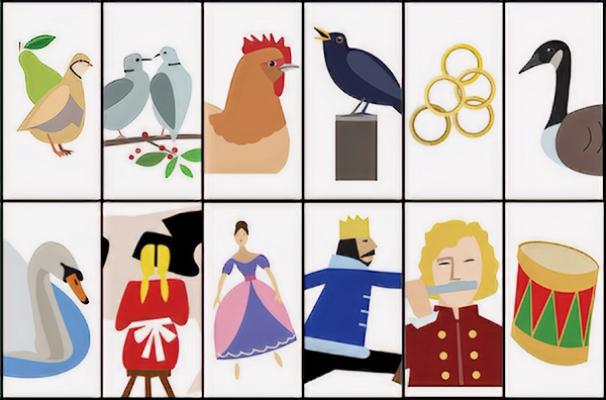
There are birds — lots of birds — gold rings, milking maids, dancing ladies, leaping lords, pipers and drummers, but is there a deeper meaning behind the gifts received in "The Twelve Days of Christmas?"
The song, which dates to 1714 Newcastle, England, according to the 1864 book, “Songs of the Nativity” by William Henry Husk, recalls gifts the singer’s “true love” gave them over the course of the 12-day Christmas season, Dec. 25 through Jan. 5, Twelfth Night (defined by the Oxford English Dictionary as "the evening of Jan. 5, the day before Epiphany”), which traditionally marks the end of Christmas celebrations.
For many, the cumulative song is simply a fun Christmas carol, but in 1979, English teacher and hymnologist Hugh D. McKellar of Canada wrote a short article, "How to Decode the Twelve Days of Christmas," in which he theorized the song’s lyrics were intended to help teach the catechism of the Church following the Protestant Reformation when Catholicism was outlawed in England from 1558 through 1829.
According to McKellar, each gift had a correlation to the Church:
Three years after McKeller published his article, Catholic priest Father Hal Stockert picked up his idea and used it as the basis for an article he wrote in 1982 and posted online in 1995.
It is an interesting theory, but, unfortunately, McKellar provided no historical evidence to tie his thoughts to the historical record. In fact, Snopes.com, a website that reviews stories of unknown or questionable origin, said the hypothesis that the song hides the Catholic catechism is incorrect.
David Mikkelson, author of the Snopes article, wrote, “Although Catholics and Anglicans used different English translations of the Bible (Douai-Reims and the King James version, respectively), all of the religious tenets supposedly preserved by the song ‘The Twelve Days of Christmas’ (with the possible exception of the number of sacraments) were shared by Catholics and Anglicans alike…. there was absolutely no reason why any Catholic would have to hide his knowledge of any of the concepts supposedly symbolized in ‘The Twelve Days of Christmas,’ because these were basic articles of faith common to all denominations of Christianity. None of these items would distinguish a Catholic from a Protestant, and therefore none of them needed to be ‘secretly’ encoded into song.”
Father Jerome Kodell, OSB, former abbot of Subiaco Abbey, agreed.
“The catechism interpretation is preposterous because the scheme wouldn't work in a Protestant country,” he said. “The song could function as a Christian subterfuge only in a non-Christian context or country, not in Protestant England. English Protestants would be teaching their children the same Christian truths as Catholics, so the use of this song would not tell you whether a family were Protestant or Catholic.”
Mikkelson said the carol most likely started in France and cites the 1780 children’s book “Mirth Without Mischief” that says the song was a Twelfth Night "memory-and-forfeits" game in which the song leader recited a verse, each of the players repeated the verse, the leader added another verse, and so on until one of the players made a mistake and was out of the game or had to give a treat to the other players.
Father Andrew Hart, JCL, theological consultant to Arkansas Catholic and adjutant judicial vicar for the Diocese of Little Rock Tribunal, said the 12 days of Christmas is more a cultural rather than an ecclesial or liturgical tradition.
“In the liturgical calendar of the Latin Church, the Octave of Christmas begins on Dec. 25, Christmas Day, and continues for eight days following,” Father Hart said. “Octaves are eight-day periods of celebration and rejoicing for the most important feasts of the Church, Christmas Day and Easter Sunday, but there used to be many more.”
The 12-day period that is culturally significant could have its origins in a decree from a meeting of bishops in Tours, France, in 567, which stated the Christmas season was to extend from Dec. 25 until Jan. 6, he said, but noted, the liturgical season of Christmas begins with the the Solemnity of the Nativity of the Lord and runs through the feast of the Baptism of the Lord, after which Ordinary Time begins.
Father Kodell said Epiphany is the older feast than Christmas, and in the Eastern Church and some parts of the Western Church it is the dominant feast of this season.
Please read our Comments Policy before posting.
Article comments powered by Disqus Total solar eclipse brings thousands to Arkansas
Total solar eclipse brings thousands to Arkansas
 Young Arkansans explore single life amid vocations
Young Arkansans explore single life amid vocations
 How to create a more prayerful life this Lenten season
How to create a more prayerful life this Lenten season
 Arkansans reflect on Scripture study after 50 years
Arkansans reflect on Scripture study after 50 years
 Two new priests get first assignments in Texarkana, LR
Two new priests get first assignments in Texarkana, LR
 Studio 3:16 offers new approach to teaching religion
Studio 3:16 offers new approach to teaching religion
 After three decades, NLR principal plans to retire
After three decades, NLR principal plans to retire
 CHS athlete overcomes odds to reach collegiate goal
CHS athlete overcomes odds to reach collegiate goal
 John Calipari: UA basketball coach and devout Catholic
John Calipari: UA basketball coach and devout Catholic
 'Cabrini' film tells story of saint with great faith
'Cabrini' film tells story of saint with great faith
 St. Joseph a model of solidarity with immigrants
St. Joseph a model of solidarity with immigrants
 Two gifts after Jesus’ death: Virgin Mary and Eucharist
Two gifts after Jesus’ death: Virgin Mary and Eucharist
 Why we have an altar, and not just a communion table
Why we have an altar, and not just a communion table
 Pope: Wars should be resolved through nonviolence
Pope: Wars should be resolved through nonviolence
 Living relationship with Jesus Christ in the Eucharist
Living relationship with Jesus Christ in the Eucharist